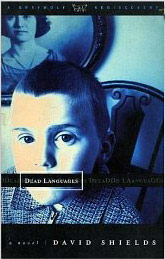
David Shield’s novel, Dead Languages, is an intensely personal narrative about the life of Jeremy Zorn, growing up in San Francisco in the 60s and 70s, who happens to have a severe stutter. The book opens with memories of formative experiences from his early childhood, mainly the strong personalities of his highly intellectual and verbose family, particularly his mother.
We begin with an allusion to Demosthenes, the famous stutter-ridden pundit of the ancient world, giving the reader clues to the education and outlook of the writer. Jeremy also addresses “Sandra”, who we discover later on is the speech therapist he seeks out in a time of great desperation.
Ever-questioning, Jeremy searches his childhood for clues about how his stuttering manifested itself. Some readers might not like the responsibility for this that he puts on his mother, who tries to cure his problem early on by having him describe pictures on flash cards, and who gives perplexing attention to his stuttering throughout his life. As a child Jeremy is in awe of human speech, finding it terrifying and fascinating. Plagued by the self-doubt and anxiety that often accompanies stuttering, he senses himself as being “outside general language”, insisting on “the one station that won’t come in.” Yet, this intense book is not without humour and lighthearted touches. One particularly hilarious scene involves Jeremy, trying to fit in with some boys from school, agreeing to make a prank phone call, only to have his stuttering elicit an unexpected reaction in his victim.
Like Demosthenes, Jeremy is drawn to succeed in the realm most unattainable for him – he wants to communicate with words. He becomes politically active in Junior High School, giving speeches in support of civil rights, and later joins a debating club. Although his efforts are valiant, he never achieves the trancendency that he is looking for.
In university, he becomes obsessed with the study of Latin, which evokes the book’s title. Latin, no longer used in any living society, “existed only in writing” and “could never again be articulated,” at least not in any societal way. It is at this point that Jeremy realizes just how divorced he has become from regular society, and breaks out of his seclusion by seeking speech therapy.
Jeremy’s life is marked by powerful women: his mother, his sister, his speech therapist and his girlfriend, each of whom has her own notion of how he should best cope with his impediment. He loves them all, yet his relationships with them are ridden with frustrations, misunderstandings and ideological differences.
Smart, funny and surprising, Dead Languages is a book that any appreciative reader would enjoy, not just people who stutter. Nevertheless it certainly has special irony for those who know first hand how stuttering can create deep personal crises, and the physical and emotional challenges it presents in a person’s life.
